Whether you’re a seasoned grill master or an avid cook in need of the perfect backyard BBQ setup, protecting your investment is crucial. One question that commonly arises is: do grills need to be covered? Handling this aspect can make all the difference between enjoying your grill for years and prematurely retiring it due to weather damage.
In this blog, we’ll dive into the benefits of covering your grill, weigh up some pros and cons, explore various cover types, and share best practices for preserving that prime outdoor cooking experience.
Key Takeaways
- Covering your grill is highly recommended to protect it from the elements, prevent rust and corrosion, keep pests away, and preserve its exterior.
- Vinyl, polyester, and canvas are commonly used materials for grill covers. Choose a cover that fits snugly over your grill while allowing proper ventilation.
- Before covering your grill, ensure it’s clean of dirt, grease, and food residue. Regular cleaning can help prevent the buildup of debris that may attract unwanted guests.
Reasons To Cover Your Grill
Covering your grill provides protection from the elements, preventing rain, snow, and extreme temperatures from damaging the exterior of your grill. It also helps to prevent rust and corrosion from forming on the metal components of your grill over time.
Protection From The Elements
Grill owners often contend with various weather conditions and elements that can have a detrimental impact on their grills. A well-designed grill cover offers an essential layer of protection, helping to shield your prized possession from harsh sun rays, rain, snow, ice, dust, and those pesky bird droppings.
Additionally, covers protect against damaging UV rays which could cause fading or other cosmetic issues over time. Even tree sap – notorious for its ability to stick around on surfaces – doesn’t stand much chance against a high-quality grill cover in place.
Prevention Of Rust And Corrosion
One major reason to cover your grill is the prevention of rust and corrosion. Exposure to various elements, such as rain, snow, or even chemicals from swimming pools like chlorine and bromine can lead to your grill deteriorating over time.
However, it’s essential to use caution when covering your grill; trapped moisture underneath the cover can also cause corrosion. To avoid this issue while still protecting against potential damage from lawn chemicals or harsh weather conditions, make sure you regularly clean the grates and apply anti-rust spray before using the cover.
Additionally, consider investing in covers with proper ventilation features to allow humidity and moisture to escape rather than be trapped inside.
Keeping Pests And Rodents Away
One of the most important reasons you need a grill cover is to keep pests and rodents away. A covered grill becomes less accessible for critters seeking shelter or feeding on leftover food particles.
Rodents, such as mice, are known to make nests in grills that provide a dark and quiet space for them to raise their young.
Aside from using a reliable grill cover, it’s crucial to maintain cleanliness around your grilling area. Regularly cleaning your grill after use ensures no lingering scents or food debris attract unwanted guests.
Preserving The Grill’s Exterior
One of the most important reasons to cover your grill is to preserve its exterior. A high-quality grill can be a significant investment, and as such, it’s essential to keep it looking good for years to come.
By using a durable grill cover made from materials like vinyl or polyester, you can protect against scratches and dings caused by falling branches or other debris.
If left unprotected, exposure to rain, sap, lawn chemicals, and other outdoor elements can lead to stains and discoloration that are tough (if not impossible) to remove.
Pros And Cons Of Using A Grill Cover
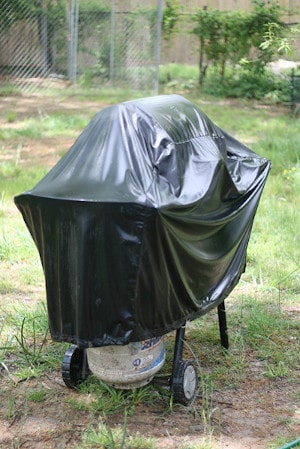
Using a grill cover has its advantages, such as protection from the elements and preventing rust and corrosion, but there are also potential drawbacks to consider.
Advantages Of Covering Your Grill
Using a grill cover has several advantages for preserving the quality of your investment. For starters, covering your grill provides protection from the elements- rain, snow, wind, and even harsh sunlight.
These conditions can cause significant damage to metal grates, burners, and other vital equipment that comprises a grill.
Furthermore, using a cover keeps pests like rodents and insects at bay when not in use. It prevents debris such as leaves and tree sap from sticking onto the surface of the grill’s exterior which requires thorough cleaning later on.
Covering your grill also helps maintain its appearance; thus it looks new longer than one left without proper protection.
Potential Drawbacks Of Using A Grill Cover
While grill covers can provide a great deal of protection for your outdoor cooking equipment, there are also some potential drawbacks to consider. One of the main concerns is that covers can trap moisture and cause rusting if not used properly.
This is especially true in humid climates or areas with frequent rain or snow.
Another potential issue with using a cover is the added inconvenience of having to remove it before every use. If you forget to take it off before starting up your grill, you could be at risk for a gas leak or fire hazard.
However, these drawbacks are often outweighed by the benefits of protecting your investment and extending the life of your grill through proper maintenance and care.
Different Types Of Grill Covers
Vinyl covers are affordable and lightweight, making them a good option for those on a budget or with smaller grills, while polyester and canvas covers offer more durability and protection from the elements.
Vinyl, Polyester, And Canvas Covers
There are different types of grill covers available in the market. Vinyl, polyester, and canvas are the most commonly used materials for grill covers. Vinyl is a popular choice because it is durable and water-resistant, which helps keep your grill dry during rainy weather.
On the other hand, polyester covers are lightweight and offer similar protection as vinyl from rain and snow.
When choosing a cover for your grill, make sure to consider factors such as climate conditions in your area, the quality of the fabric used, and the size of the cover that fits snugly over your grill without flapping around in winds or letting unwanted pests get inside.
Best Practices For Covering Your Grill
Choosing The Right Cover
Choosing the right grill cover is essential to protect your grill and extend its lifespan. Here are some things to consider when buying a grill cover:
- Material – Look for heavy-duty materials such as vinyl, polyester, or canvas that are waterproof and can withstand harsh weather conditions. Choose a material that is thick enough to provide adequate protection yet lightweight enough to take on and off easily.
- Fit – Make sure you select a cover that fits your grill snugly. A well-fitting cover will help prevent pests and rodents from getting in and keep water from pooling inside.
- Ventilation – Choosing a cover with vents will allow air to circulate under the cover, preventing moisture buildup and keeping your grill dry.
- Durability – Invest in a high-quality cover that can last for years with proper care. Cheaper covers may need replacement every season, which can add up over time.
- Customization – If you have an irregularly shaped or sized grill, consider investing in a custom-designed cover for optimal protection.
By considering these factors, you can choose the right grill cover that fits your needs and budget while ensuring your grill remains protected and ready for use during the grilling season.
Cleaning The Grill Before Covering
Before covering your grill, it’s important to give it a thorough cleaning. This will not only ensure that your grill stays in good condition but also prevent any potential fire hazards from leftover food and debris.
Start by turning on the heat to high for several minutes to loosen any stubborn residue. Then use a brush or scraper to remove any remaining debris.
Regularly cleaning your grill after every use can help prevent the buildup of grease and other materials which may attract pests like rodents or insects to your grill.
Proper Storage And Maintenance
Proper storage and maintenance are crucial to extend the life of your grill and keep it looking like new. Here are some tips for storing and maintaining your grill:
- Clean your grill thoroughly before storing it, using mild soap and water to remove any grease or debris.
- For gas grills, turn off the gas supply at the propane tank or natural gas line and disconnect all hoses. Inspect hoses for cracks or damage and replace if necessary.
- Coat vital parts of the grill with a light layer of cooking oil to repel moisture and prevent rust.
- Find a cool, dry place to store your grill indoors, such as a garage or shed. If you must store it outdoors, cover it with a high-quality grill cover that fits snugly over the entire grill.
- Store propane tanks upright in an open, well-ventilated area away from heat sources and sparks.
- Regularly check your grill for signs of wear and tear, such as rusted parts or loose screws, and address them promptly.
By properly caring for your grill during storage, you can help ensure that it will be ready to use again when you’re ready to fire it up next season!
Alternatives To Traditional Grill Covers
While traditional grill covers are the go-to option for protecting your grill, they may not always be the best fit for your needs. Fortunately, there are other options available that can still provide protection.
One alternative is using a tarp or heavy-duty plastic sheeting to cover your grill.
Another option is repurposing an old tent as a DIY cover. Tents already provide waterproof and UV protection, so they make for great temporary solutions when you need to protect your grill from harsh weather conditions.
Custom grill covers can be made to fit your specific grill and provide the best protection possible.
When And How To Use A Grill Cover
Make sure to always use your grill cover during bad weather or extended periods of non-use, as this will protect your grill from rust, corrosion, and pests. For best results, choose a high-quality cover that fits your grill snugly and allows for proper ventilation.
Covering During Bad Weather
Covering your grill during bad weather can be both beneficial and detrimental. While it may protect the grill from rain, snow, and wind, covering the grill may trap humidity underneath the cover which can cause corrosion over time.
It’s important to ensure proper ventilation if you decide to cover your grill during a stormy day.
It’s also worth noting that leaving a gas grill covered for an extended period of time could lead to dangerous gas leaks if moisture builds up inside and causes rusted holes in the burners or tubes.
To avoid this issue, consider purchasing a high-quality custom-fit cover that will last through all kinds of weather conditions and properly caring for your grill by cleaning it regularly with a mild soap before covering it again.
Covering During Extended Periods Of Non-use
When your grill is not in use for an extended period, it’s important to cover it properly to protect it from the elements. However, covering your grill improperly during long periods of non-use can also lead to trapped humidity and corrosion due to a lack of airflow.
Proper storage and maintenance are crucial for prolonging the life of your grill. The last thing you want is to uncover your grill after several months only to find that rust has taken over or there’s moisture inside that could cause potential damage.
Covering For The Off-season
When the grilling season is over, it’s important to properly cover and store your grill. This will help protect it from harsh winter weather conditions such as snow, ice, and freezing temperatures.
To keep your grill in good working condition for years to come, invest in a high-quality grill cover that fits snugly over the entire unit.
Before covering it up for storage, be sure to clean both the interior and exterior of the grill with mild soap and water or a specialized cleaner. Then, let it dry completely before placing the cover on top.
Covering A Hot Or Warm Grill
It’s crucial to avoid covering a hot or warm grill as it can lead to humidity and moisture being trapped under the cover, causing corrosion. Instead, allow your grill to cool down before putting on a cover.
Additionally, using the wrong material for your grill cover can cause damage and even potentially start a fire if placed on a hot surface.
In conclusion, always wait until your barbecue has completely cooled before applying any type of cover.
Ensuring Proper Ventilation
Proper ventilation is essential when covering your grill to prevent trapped moisture. Without adequate ventilation, the cover can trap humidity, leading to corrosion and other damage to your grill.
Look for a cover with built-in air vents that allow proper airflow while still providing protection from the elements. For example, Weber’s premium covers feature adjustable side straps that secure the cover in place, while also having breathable and weather-resistant fabric.
Additionally, it is important to ensure proper ventilation when grilling under a covered porch or patio as carbon monoxide poisoning could occur from inadequate airflow.
Conclusion
In conclusion, it’s highly recommended that you cover your grill when not in use. The benefits of doing so far outweigh the potential drawbacks. Not only does a quality grill cover protect your investment from the elements and prevent rust and corrosion, but it also keeps pests at bay while preserving your grill’s exterior.
Of course, there are pros and cons to using a cover, but with proper storage and maintenance routines in place, you can easily overcome these issues.
Frequently Asked Questions:
1. Why should I consider covering my grill?
Covering your grill can protect it from weather damage, dust, and debris that could affect the performance of your grill. It can also help prolong its lifespan by preventing rust or corrosion that often forms on exposed metal surfaces.
2. What type of cover should I use for my grill?
You can find custom covers designed to fit specific models or a universal cover for most grills available in different sizes and materials such as vinyl, canvas, or polyester. It is best to choose a waterproof material with UV protection to prevent fading and cracking over time.
3. Is it necessary to store my covered grill indoors?
It is recommended if you have enough space indoors; storing your covered grill will guarantee maximum protection from harsh weather conditions, especially during wintertime when snow, frost, and ice may cause severe damage if left outside uncovered.
4. Can cover my grill lead to any problems?
If improperly stored or used, covering your grill may trap moisture inside which could lead to mold growth or even fire hazards due to the accumulation of gas fumes without proper ventilation. Therefore, it’s crucial always keep an eye out for any potential issues while using a cover as part of an overall maintenance routine for the best results over time!
5. What if my grill isn’t exposed to rain?
Even if your grill isn’t exposed to rain, it’s still a good idea to cover it to keep it looking new and to extend the life of your grill.
6. Should I cover my stainless steel grill?
Yes, you should cover your stainless steel grill because it can still get water spots and other damage from exposure to the elements.
7. Do I need to remove my grill cover every time I use the grill?
It’s recommended to remove the grill cover every time you use the grill to prevent any damage that may occur if you’re not careful with the cover.
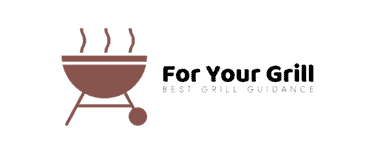
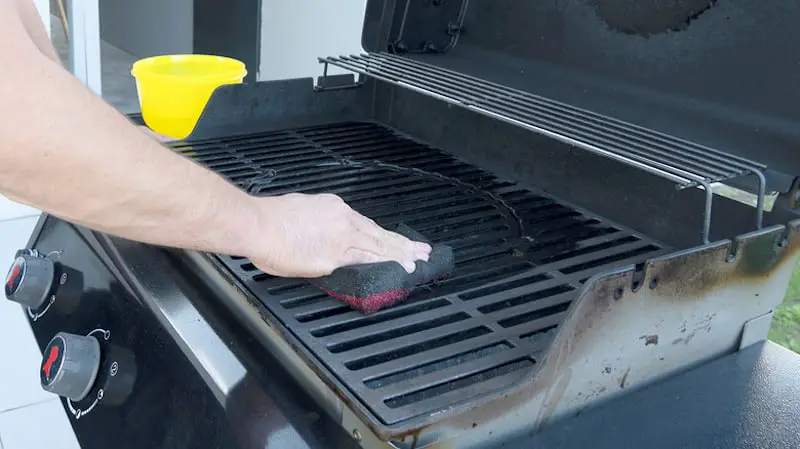
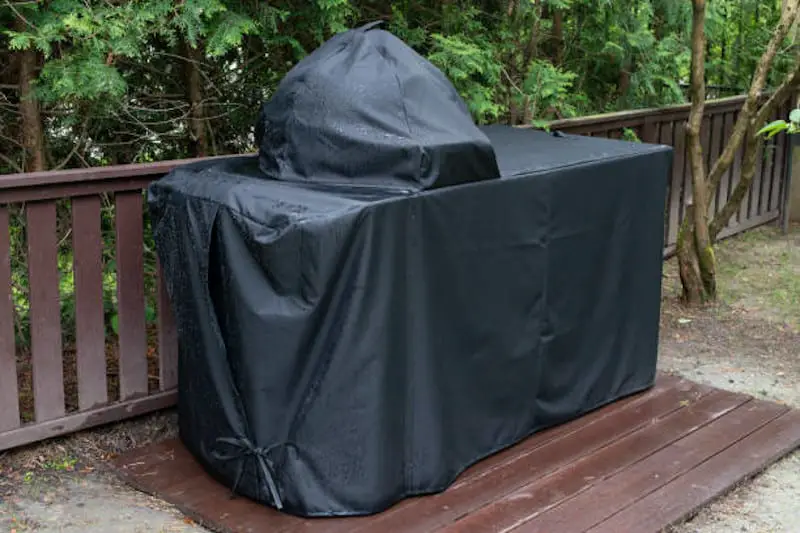
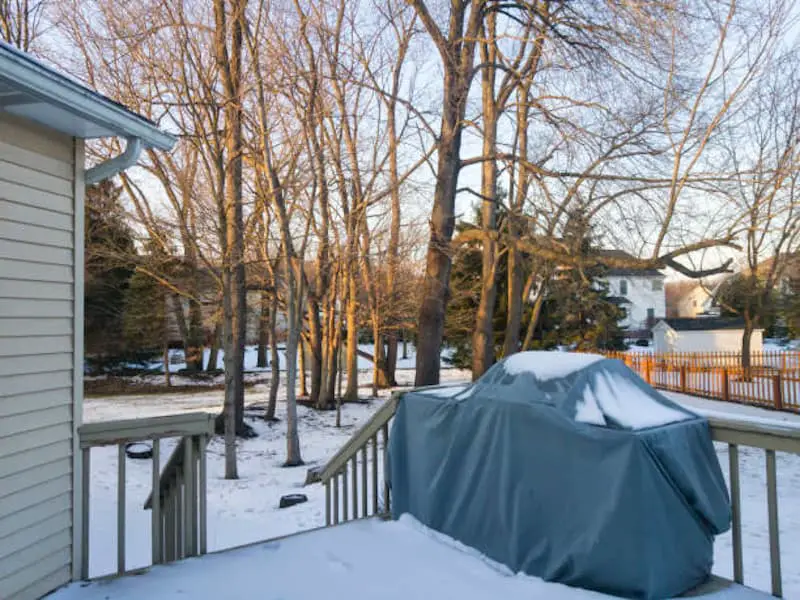
Leave a Reply